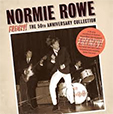 We don’t have pop stars in Australia any more. In their place, we have reality TV-manufactured, milksop product whose fame is carefully designed to meet a demographical need and is disposable as the songs somebody else writes for them. Just as the tag “R & B” has been diluted beyond recognition, these people aren’t pop stars in the true sense of the term.
We don’t have pop stars in Australia any more. In their place, we have reality TV-manufactured, milksop product whose fame is carefully designed to meet a demographical need and is disposable as the songs somebody else writes for them. Just as the tag “R & B” has been diluted beyond recognition, these people aren’t pop stars in the true sense of the term.
You might know him for an infamous TV fist fight with a shock jock (and, hey, that was almost one lifetime ago) but back in the 1960s, Normie Rowe was one of Australia’s first bona fide pop stars. There was no need to manufacture stars back then – the media certainly was complicit but they largely just appeared – and the good looking Rowe inspired teen adulation on the back of a string of national hits.
Scandalous behaviour by pop stars only copped superfluous media scrutiny and mainstream disapproval was a plus. Normie undoubtedly had his moments but was obviously on the side of the clean-cut brigade. That’s why the Aussie equivalent of the Draft Board rigged the draw to “do an Elvis” and send him to Vietnam.
“Frenzy” documents Rowe’s brief run with 30 tracks of beat pop energy. It’s not ‘60s punk or as primal (and underground) as anything from the “Ugly Things” compilations. It is rough around the edges and recorded live to tape.
It’s from “Porgy and Bess” so “It Ain’t Necessarily So” was an odd choice for a pop song (thanks were due to DJ Stan Rofe for suggesting it.) The writing royalties went to George Gershwin but Rowe struck figurative gold and stormed into the Aussie pop charts. Of course, being banned by the Catholic Church-owned 2SM in Sydney for being sacrilegious can’t have hurt. Fame and comparative fortune followed.
Rowe wasn’t a songwriter. “Que Sera Sera” upped the ante in the cover song stakes but can’t top his version of “Shakin’ All Over”. Only the Who’s live cover beats it.
Like any Aussie pop idol worth his salt, Rowe went to London. He recorded with session men John Paul-Jones and Jimmy Page (later to find their own fame), hit the US touring treadmill and put out some respectable freakbeat singles (“Sad” is a ripper.) His military service put the kybosh on his brief pop career. Rowe went on to fame as a stage and TV actor but roared back into the musical spotlight with the Long Way To The Top series of revival shows.
The songs on “Frenzy” are all re-mastered (by Aztecs drummer Gil Matthews) and sound great. He may have been regarded as a lightweight by his peers - mainly through his choice of material and idol status - but Rowe’s vocal has an edge that ensures he stood apart from much of the dross that clogged much of the airwaves back then.
Rowe’s pop career really only lasted two years (although his label would release material in his absence on military service) and “Frenzy” shows he was nothing if not prolific. Cock an ear to this collection if Oz Rock’s (pre) history means anything to you. As Uncle Lou would go on to write in another, far away universe: “Those were different times.”

 1/2
1/2

